
46 minute read
Trade and General Interest
Bears of the North
A Year Inside Their Worlds by WAYNE LYNCH
SEE PAGE 24
TRADE & GENERAL INTEREST
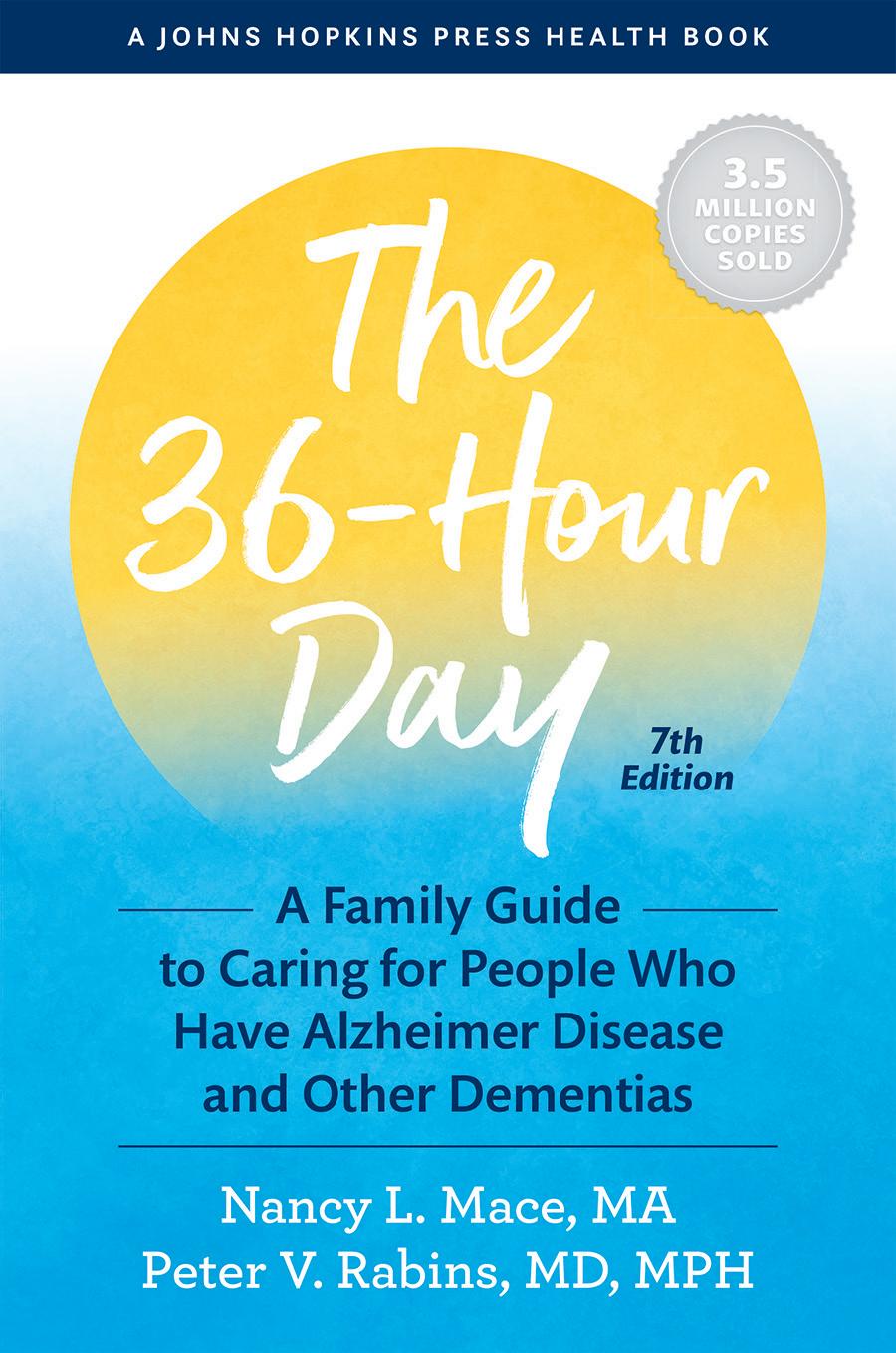
A Johns Hopkins Press Health Book
AUGUST 440 pages 7 x 10
978-1-4214-4171-9 $19.95 £15.00 pb
978-1-4214-4170-2 $56.99 £42.00 hc
Large print edition
978-1-4214-4173-3 $24.95 £18.50 pb
THE 36-HOUR DAY
A Family Guide to Caring for People Who Have Alzheimer Disease and Other Dementias seventh edition, also in large print edition
NANCY L. MACE, MA, and PETER V. RABINS, MD, MPH
For 40 years, The 36-Hour Day has been the leading work in the field for caregivers of those with dementia. Written by experts with decades of experience caring for individuals with memory loss, Alzheimer’s, and other dementias, the book is widely known for its authoritativeness and compassionate approach to care. Featuring everything from the causes of dementia to managing its early stages to advice on caring for those in the later stages of the disease, it is widely considered to be the most detailed and trusted book available.
Highlighting useful takeaway messages and informed by recent research into the causes of dementia, this new edition has been completely updated. It features
• brand-new content on everything from home care aides to useful apps to promising preventative techniques and therapies
• practical advice for avoiding caregiver burnout—plus tips for when and how to get additional help
• a completely new two-column design
that allows readers to quickly access what they need
• a bonus accompanying website that keeps readers updated on what’s new in dementia caregiving
The central idea underlying this indispensable book—that much can be done to improve the lives of people with dementia and of those caring for them—remains the same. The 36-Hour Day is the definitive dementia care guide.
With over 3.5 million copies sold, the bestselling guide to understanding and caring for people with dementia is now completely revised and updated!
Praise for previous editions “Thorough and compassionate, offering accessible information and practical advice, The 36-Hour Day is a necessary resource for families living with dementia. Still the gold standard, this book is the trusted reference that families turn to first—and over and over— for guidance and support in caring for someone with Alzheimer’s disease.” —Lisa Genova, author of Still Alice
“Excellent guidance and clear information of a kind that the family needs . . . The authors offer the realistic advice that sometimes it is better to concede the patient’s frailties than to try to do something about them, and that a compassionate sense of humor often helps.”—The New York Times “This is for carers and families, but equally should be on the reading list for nursing and medical students. Every ward should have a copy as nursing and clinicians can learn so much from this and ensure a high standard of care for these patients.”—Nursing Times

“For a reader who wants a book about Alzheimer’s and caregiving, this is still the one to buy. Recommended.” —Choice
Before she retired, NANCY L. MACE, MA (CONCORD, CA), was a consultant to and member of the board of directors of the Alzheimer’s Association and an assistant in psychiatry and coordinator of the T. Rowe and Eleanor Price Teaching Service of the Department of Psychiatry and Behavioral Sciences of the Johns Hopkins University School of Medicine. PETER V. RABINS, MD, MPH (TOWSON, MD) is a professor of the practice in the Erickson School of Aging Management Services at the University of Maryland, Baltimore County. The author of Is It Alzheimer’s? 101 Answers to Your Most Pressing Questions about Memory Loss and Dementia, he was the founding director of the geriatric psychiatry program and the first holder of the Richman Family Professorship of Alzheimer Disease and Related Disorders in the Department of Psychiatry and Behavioral Sciences of the Johns Hopkins University School of Medicine. TABLE OF CONTENTS
Foreword Preface 1. Dementia 2. Getting Medical Help for the Person
Who Has Dementia 3. Characteristic Behavioral Symptoms in People Who Have Dementia 4. Problems in Independent Living 5. Problems Arising in Daily Care 6. Medical Problems 7. Managing the Behavioral and
Neuropsychiatric Symptoms of Dementia 8. Symptoms Associated with Mood Change and Suspiciousness 9. Special Arrangements If You Become Ill 10. Getting Outside Help 11. You and the Person Who Has Dementia 12. How Caring for a Person Who Has Dementia
Affects You 13. Caring for Yourself 14. Financial and Legal Issues 15. Long-Term Care Arrangements 16. Preventing and Delaying Cognitive Decline 17. Brain Disorders and the Causes of Dementia 18. Research in Dementia Index
A Johns Hopkins Press Health Book

DECEMBER 384 pages 7 x 10 131 color photos, 10 color illus.
978-1-4214-4194-8 $29.95 £22.00 hc
Also available as an e-book
WEIGHT LOSS FOR LIFE
The Proven Plan for Success
foreword by Jeanne M. Clark, MD, MPH
In Weight Loss for Life, Lawrence J. Cheskin, MD, FACP, and Kimberly Anne Gudzune, MD, MPH from the Johns Hopkins Healthful Eating, Activity & Weight Program provide you with all of the information you need on your weight loss journey. They bring together leading experts in behavioral health, nutrition, exercise, and nursing to help you develop a plan that works best for you—and that’s not focused on just restricting calories or certain foods. Anyone struggling with unwanted weight gain or obesity will find this program to be helpful, compassionate, and clear.
A central feature of the program is a Personal Plan of Action to help you set reachable goals, plan your meals, and make time for movement. All the recommendations are customizable based on your personal health and needs. You’ll enjoy the interactive features, too, with surveys throughout asking you to reflect on your own eating habits as well as barriers to success. And unlike other works on the market, Weight Loss for Life covers it all: supplements, prescription medications, med spas, and surgical options. If you struggle, it can help you get back on track. Throughout, testimonials from others who have followed the program along with hundreds of photographs and drawings will help educate and keep you motivated along your weight loss journey.
Weight Loss for Life is the guide to the science and art of achieving and maintaining a healthful weight.
This is not a fad diet book. This is the most comprehensive, scientifically based program to lose weight and keep it off, with practical details about diet and nutrition, movement and motivation, medications, supplements, surgery, and more.
TABLE OF CONTENTS
“This evidence-based, easy-to-understand approach to weight loss provides readers with the appropriate tools they need to be successful long term in reaching their own individualized goals. More comprehensive than other weight loss books on the market, this book is a valuable resource for anyone wanting to lose weight safely and effectively.” —Virginia Quick, PhD, RDN, Rutgers University “The lessons I learned from Dr. Cheskin and his team—including the importance of regular, daily exercise—have improved my health dramatically. This book will be a great resource for others wanting to lose weight and keep it off.” —Margaret S. Chisolm, MD, FAMEE, FACP, FAAP

Foreword Preface Acknowledgments 1. We’re Glad You’re Here 2. Getting Ready 3. Beginning Your Self-Assessment 4. Unlocking Eight Keys to Success 5. Strategic Stress Management 6. Designing Your Dietary Plan 7. Food Shopping, Meal Planning, and
Monitoring Principles 8. Designing Your Daily Movement and
Weekly Exercise Plan 9. Keeping It Off 10. Medical Solutions: Beyond Mindset and Behavior Change Resources / References / Index
LAWRENCE J. CHESKIN, MD (BALTIMORE, MD) is an adjunct professor of medicine at Johns Hopkins School of Medicine and a professor and the chair of nutrition and food studies at George Mason University. He is the author of Healing Heartburn and Losing Weight for Good: Developing Your Personal Plan of Action. KIMBERLY ANNE GUDZUNE, MD, MPH (BALTIMORE, MD) is an associate professor of medicine at Johns Hopkins School of Medicine, where she is the director of the Johns Hopkins Healthful Eating, Activity & Weight Program.
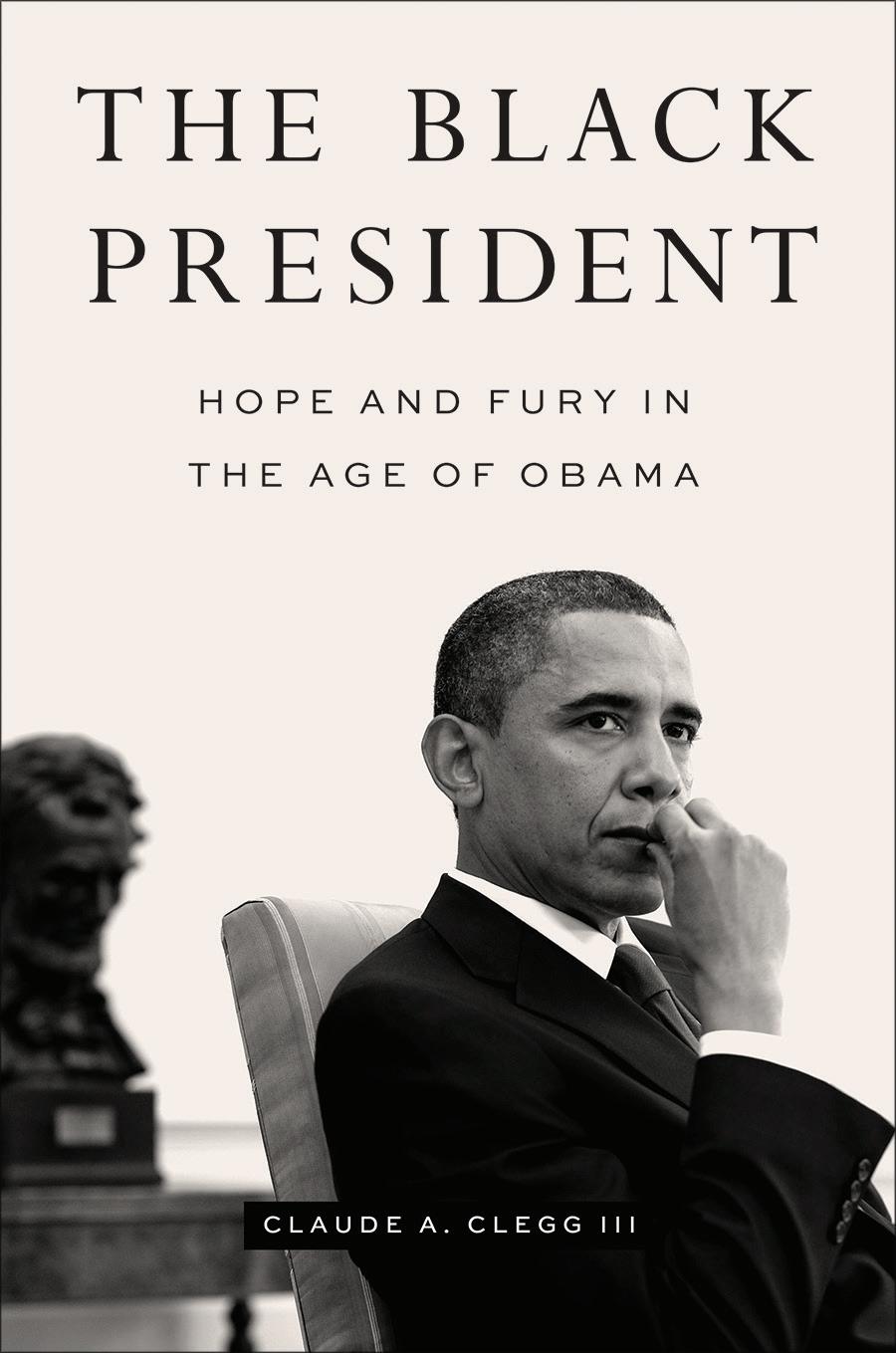
OCTOBER 712 pages 6⅛ x 9¼ 28 color photos, 4 b&w photos
978-1-4214-4188-7 $34.95 hc
Also available as an e-book Market: World Rights
THE BLACK PRESIDENT
Hope and Fury in the Age of Obama
CLAUDE A. CLEGG III
In The Black President, the first interpretative, grand-narrative history of Barack Obama’s presidency in its entirety, Claude A. Clegg III situates the former president in his dynamic, inspirational, yet contentious political context. He captures the America that made Obama’s White House years possible, while insightfully rendering the America that resolutely resisted the idea of a Black chief executive, thus making conceivable the ascent of the most unlikely of his successors.
In elucidating the Obama moment in American politics and culture, this book is also, at its core, a sweeping exploration of the Obama presidency’s historical environment, impact, and meaning for African Americans—the tens of millions of people from every walk of life who collectively were his staunchest group of supporters and who most starkly experienced both the euphoric triumphs and dispiriting shortcomings of his years in office. In Obama’s own words, his White House years were “the best of times and worst of times” for Black America. Clegg is vitally concerned with the veracity of this claim, along with how Obama engaged the aspirations, struggles, and disappointments of his most loyal constituency and how representative segments of Black America engaged, experienced, and interpreted his historic presidency.
Clegg draws on an expansive archive of materials, including government records and reports, interviews, speeches, memoirs, and insider accounts, in order to examine Obama’s complicated upbringing and early political ambitions, his delicate navigation of matters of race, the nature and impacts of his administration’s policies and politics, the inspired but also carefully choreographed symbolism of his presidency (and Michelle Obama’s role), and the spectrum of allies and enemies that he made along the way. The successes and the aspirations of the Obama era, Clegg argues, are explicitly connected to our current racist, toxic political discourse. Combining lively prose with a balanced, nonpartisan portrait of Obama’s successes and failures, The Black President will be required reading not only for historians, politics junkies, and Obama fans, but also for anyone seeking to understand America’s contemporary struggles with inequality, prejudice, and fear.
The first sweeping, legacy-defining history of the entire Obama presidency.
“This is the best book I have read about the Obama presidency. Clegg offers a compelling portrait of the president, his policies, and his reception by the African American community. Beautifully connecting the personal with the political, Clegg offers an astute assessment of Barack Obama’s many difficult choices as a candidate, leader, and public figure. The book is thorough, fair-minded, deeply researched, and fluidly written.”—Jeremi Suri, University of Texas at Austin, author of The Impossible Presidency: The Rise and Fall of America’s Highest Office

CLAUDE A. CLEGG III (DURHAM, NC) is the Lyle V. Jones Professor of History and African American Studies at the University of North Carolina at Chapel Hill.
He is the author of An Original Man: The Life and Times of Elijah Muhammad and Troubled Ground: A Tale of Murder, Lynching, and Reckoning in the New South. TABLE OF CONTENTS
Preface
Part I: A Chronic Restlessness
1. Wanderers and Dreamers 2. Joshua Rising 3. The Pendulum Swings Forward
Part II: Hope and Change
4. Bamelot 5. President of the Entire United States 6. Dancing with the Caucus 7. Man on a Tightrope 8. Pitchforks, Daggers, and Carnival Barkers 9. Guess Who’s Coming to Tea 10. Signifier-in-Chief 11. Renaissance Woman 12. The Blood of Africa 13. Demographics and Destinies
Part III: The Best of Times, the Worst of Times
14. Bamelot 2.0 15. A Second Wind 16. If I Had a Son 17. The Measure of a President 18. The Pendulum Swings Back Epilogue / Acknowledgments / Notes Bibliography / Photo Credits / Index
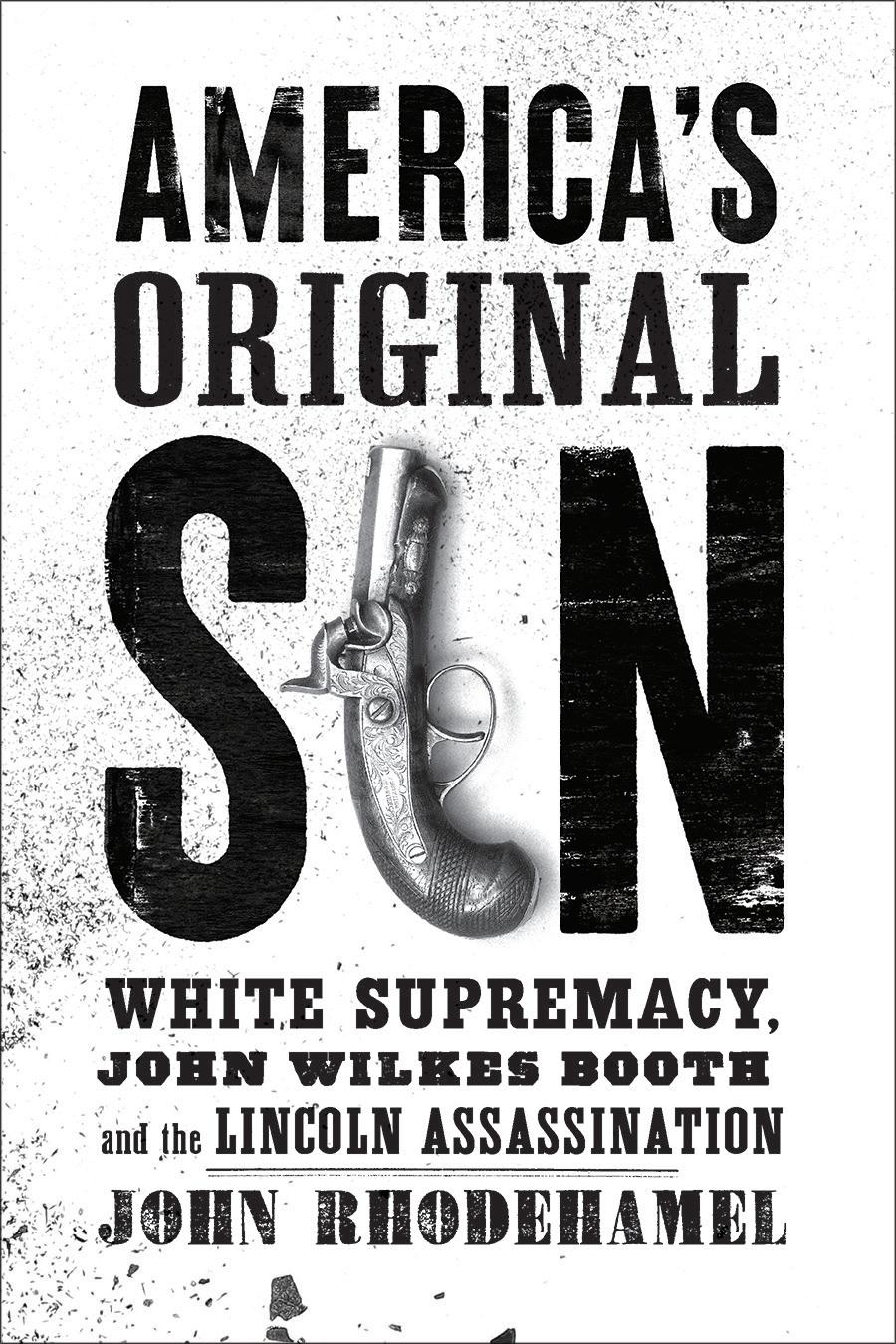
SEPTEMBER 480 pages 6 x 9 20 b&w photos, 17 b&w illus.
978-1-4214-4161-0 $27.95 hc
Also available as an e-book Market: NA
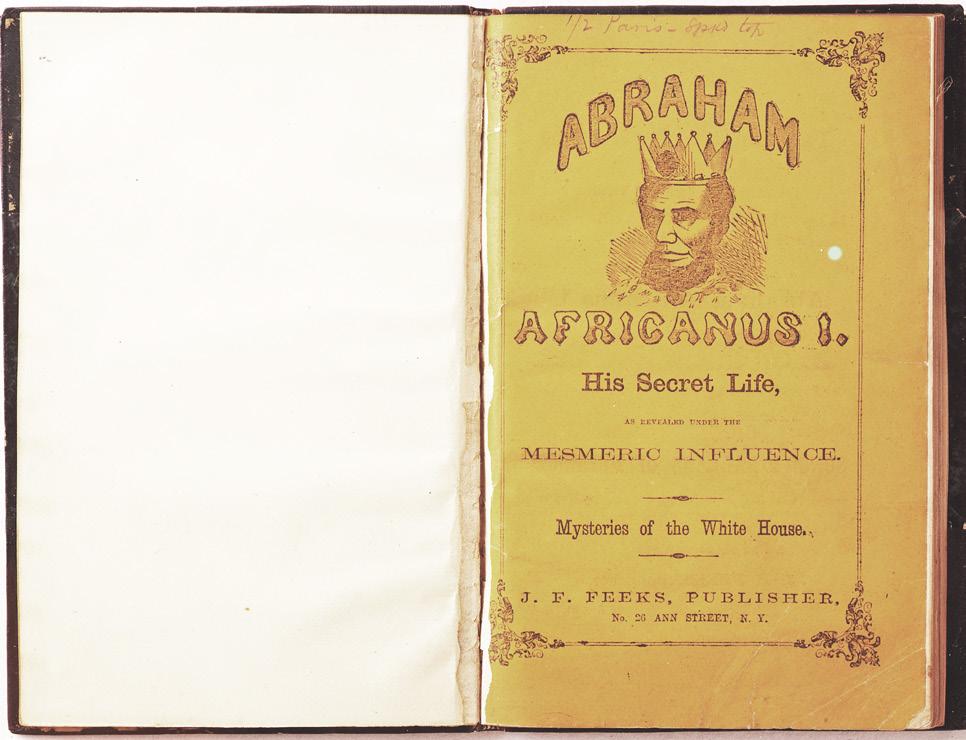
AMERICA’S ORIGINAL SIN
White Supremacy, John Wilkes Booth, and the Lincoln Assassination
JOHN RHODEHAMEL
On April 14, 1865, after nearly a year of conspiring, John Wilkes Booth shot Abraham Lincoln as the president watched a production of Our American Cousin at Ford’s Theatre. Lincoln died the next morning. Twelve days later, Booth himself was fatally shot by a Union soldier after an extensive manhunt. The basic outline of this story is well known even to schoolchildren; what has been obscured is Booth’s motivation for the act, which remains widely misunderstood nearly 160 years after the shot from his pocket pistol echoed through the crowded theater.
In this riveting new book, John Rhodehamel argues that Booth’s primary motivation for his heinous crime was a growing commitment to white supremacy. In alternating chapters, America’s Original Sin shows how, as Lincoln’s commitment to emancipation and racial equality grew, so too did Booth’s rage and hatred for Lincoln, whom he referred to as “King Abraham Africanus the First.” Examining Booth’s early life in Maryland, Rhodehamel traces the evolution of his racial hatred from his youthful embrace of white supremacy through to his final act of murder. Along the way, he considers and discards other potential motivations for Booth’s act, such as mental illness or persistent drunkenness, which are all, Rhodehamel writes, either insufficient to explain Booth’s actions or were excuses made after the fact by those who sympathized with him.
Focusing on how white supremacy brought about the Civil War and, later, betrayed the conflict’s emancipationist legacy, Rhodehamel’s masterful narrative makes this old story seem new again. The first book to explicitly name white supremacy as the motivation for Lincoln’s assassination, America’s Original Sin is an important and eloquent look at one of the most notorious episodes in American history.
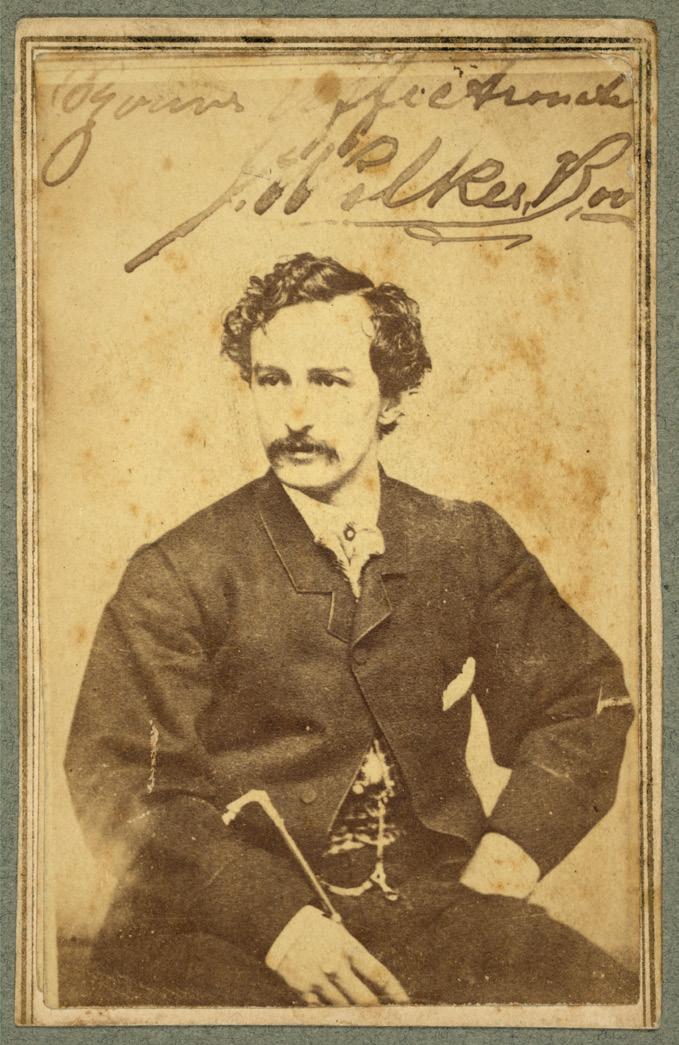

Finally, a compelling narrative history of the Lincoln assassination that refuses to ignore John Wilkes Booth’s motivation: his growing, obsessive commitment to white supremacy.
“This unique book combines Rhodehamel’s intriguing insights with the excellent characterizations and top-tier research that have always distinguished his work.”—Terry Alford, Professor Emeritus, Northern Virginia Community College, author of Fortune’s Fool: The Life of John Wilkes Booth
“By emphasizing John Wilkes Booth’s and the depth of his rage at Abraham Lincoln’s public call for black voting rights, Rhodehamel shows why the sixteenth president should be regarded as a martyr to African American civil rights.”—Michael Burlingame, University of Illinois Springfield, author of Abraham Lincoln: A Life “America’s Original Sin offers an engaging and (unfortunately) very timely review of the life of John Wilkes Booth and his assassination of Abraham Lincoln. By emphasizing Booth’s racism and devotion to white supremacist politics as the keys to his murderous deed, the author challenges the widespread notion that Booth was either simply a madman or an overzealous Southern partisan. Presenting this argument in an engagingly well-written narrative history, Rhodehamel has done a great service by bringing this point to a wide audience. An important and powerful book.”—Michael E. Woods, University of Tennessee, Knoxville, author of Arguing until Doomsday: Stephen Douglas, Jefferson Davis, and the Struggle for American Democracy
JOHN RHODEHAMEL (NEWPORT BEACH, CA) is the former archivist of George Washington’s Mount Vernon and the former curator of American historical manuscripts at the Huntington Library. His most recent book, George Washington: The Wonder of the Age, was singled out as “the only Washington biography you need” by the Wall Street Journal.
Now updated! The new edition of this bestselling guide uses science to tackle some of the most important decisions facing new parents —from sleep training and vaccinations to breastfeeding and baby food.
THE SCIENCE OF MOM
A Research-Based Guide to Your Baby’s First Year second edition
ALICE CALLAHAN, PhD
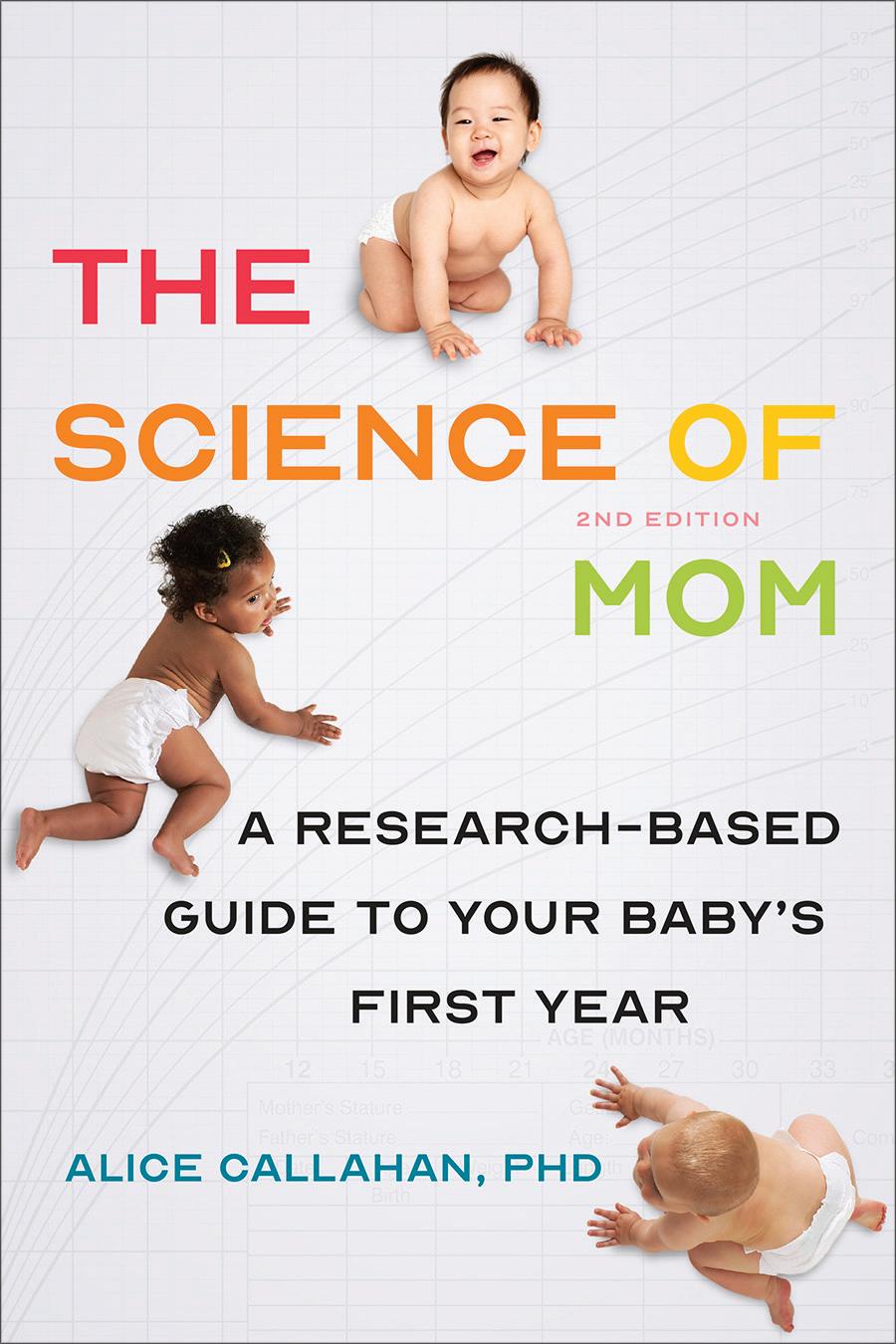
NOVEMBER 424 pages 6 x 9 10 b&w illus.
978-1-4214-4199-3 $19.95 £15.00 pb
Also available as an e-book When scientist Alice Callahan became a mom, she knew it would mean long nights of rocking and feeding the baby. What she didn’t anticipate was the barrage of parenting questions that would send her down rabbit holes of late-night internet searches. Is co-sleeping safe? How important is breastfeeding, and how can parents help it go smoothly? When should babies start eating solid foods, and are there ways to reduce the risk of food allergies? These questions can confound even the most well-informed parents, and the search for answers may open the door to a deluge of conflicting advice from well-meaning relatives, judgmental strangers on social media, and self-proclaimed internet experts.

In this revised and expanded new edition of The Science of Mom, Callahan, a science writer whose work appears in the New York Times and the Washington Post, turns again to the research literature for clarity. She shares the latest information on raising healthy babies and covers additional topics like the microbiome, attachment, dietary supplements, pacifiers, increasing breast milk production, preventing allergies, babyled weaning, and choosing an infant formula. Written with compassion and nuance, this unique guide recognizes that all families must make their own decisions and gives science-minded parents the tools to evaluate the evidence for themselves.
ALICE CALLAHAN (EUGENE, OR) holds a PhD in nutritional biology from the
University of California, Davis, and spent two years investigating fetal physiology as a postdoctoral scholar. After giving birth to her first child in 2010, she put her scientific training to work answering the big questions of caring for a baby. She is the creator of the blog Science of Mom: The Heart and Science of Parenting.
RIGHT PLACE, RIGHT TIME
The Ultimate Guide to Choosing a Home for the Second Half of Life
RYAN FREDERICK, CEO of SmartLiving 360
foreword by Paul Irving
Wondering where to live in your later years? This strategic and thoughtful guide is aimed at anyone looking to determine the best place to call home during the second half of life.
Place plays a significant role in health and happiness. The right place elevates well-being and can help promote purpose, facilitate human connection, catalyze physical activity, support financial health, and inspire community engagement. Conversely, the wrong place can be detrimental to health, as the COVID-19 pandemic has highlighted. In Right Place, Right Time, Ryan Frederick argues that where you live matters enormously—especially during the second half of your life.
Frederick, the CEO of SmartLiving 360 and a recognized thought leader on the intersection of place and healthy aging, provides you with tools to evaluate your living situation, ensuring that you weigh all the necessary factors to make a sound decision that optimizes your current and future well-being. He explores the pros and cons of different living options, from remaining in your current home to downsizing, intergenerational living, co-housing, senior living, and more. The book helps unpack specific options for place, beginning with considerations for regions and neighborhoods and then looking at specific housing models. It also focuses on how housing is changing, particularly from a technology, health, and health care perspective.
Combining real-life stories about people selecting places to live with design thinking principles and interactive tools, Right Place, Right Time will appeal to empty nesters, retirees, solo agers, and even adult children seeking ways to support their parents and loved ones.
“Ryan Frederick helps people in the second half of their life to make decisions— particularly as related to place—that optimize their chances of living a long, healthy life.”—Maria T. Brown, Syracuse University Aging Studies Institute
OCTOBER 240 pages 6 x 9 10 line drawings
978-1-4214-4230-3 $19.95 £15.00 pb
Also available as an e-book
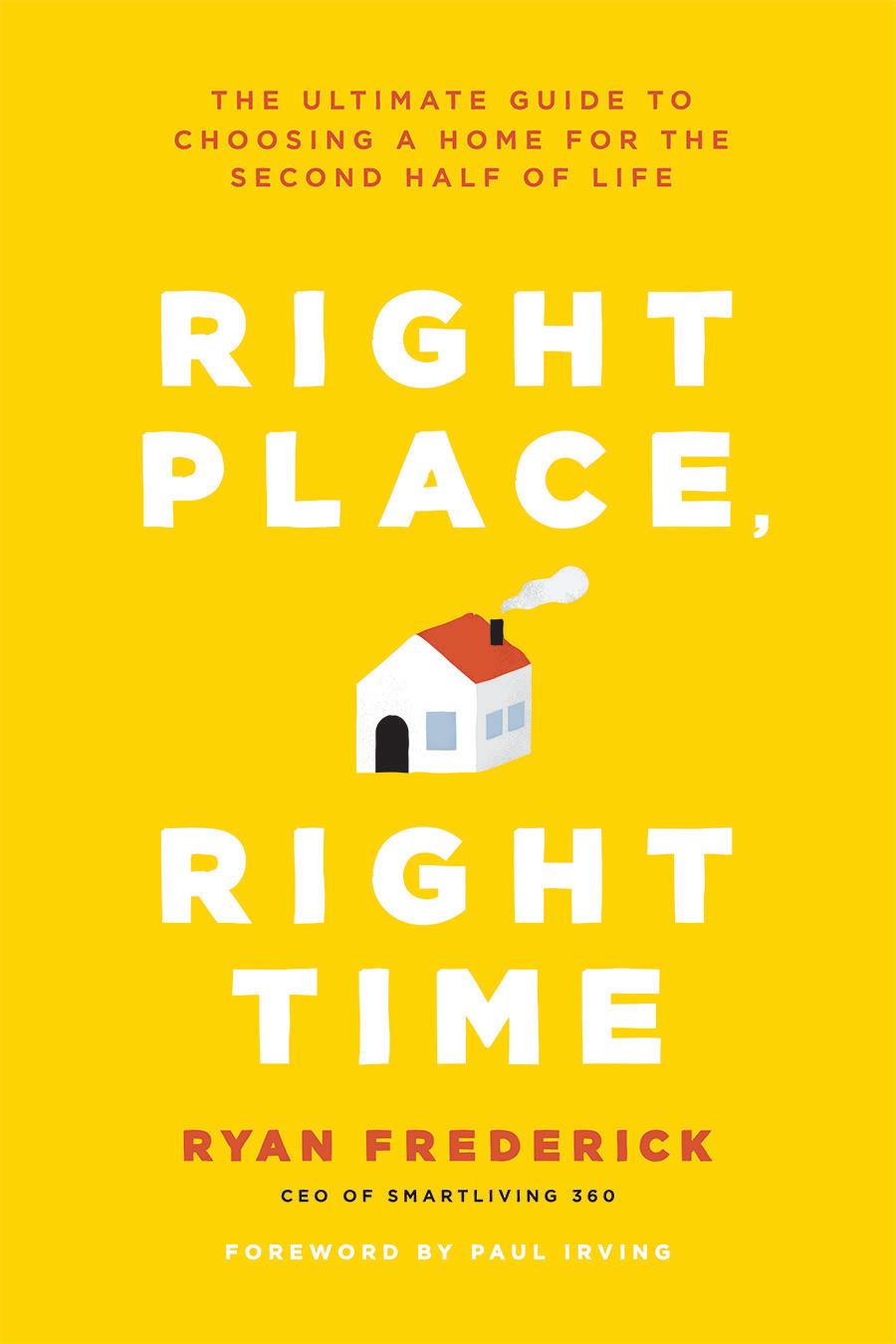
RYAN FREDERICK (AUSTIN, TX) is the CEO of SmartLiving 360, a consulting and real estate development firm that specializes in housing and healthy aging. He serves on the National Advisory Board of the Johns Hopkins University School of Nursing and was a member of the Advisory Council of the Bipartisan Policy Center Health and Housing Task Force. He is an Encore Public Voices Fellow, and his work and insights have been cited in Forbes, the Washington Post, and Environments for Aging, among other outlets.
A comprehensive, down-to-earth guide for anyone diagnosed with breast cancer.
THE BREAST CANCER BOOK
A Trusted Guide for You and Your Loved Ones

KENNETH D. MILLER, MD, and MELISSA CAMP, MD, MPH
with Kathy Steligo
Being diagnosed with breast cancer can be scary and confusing. There are medical terms to learn, options to consider, and important decisions to make, all while trying to carry on with work, family, and life. The Breast Cancer Book can’t reverse a diagnosis or make breast cancer disappear, but every page can inform and empower you or your loved ones, no matter where you are in the breast cancer experience.
Written by three trusted experts—an oncologist, a breast surgeon, and a two-time breast cancer survivor—this multidisciplinary book walks you through everything you need to know about breast cancer so you can make the best decisions about diagnosis, treatment, and follow-up care. In plain, easy-to-understand language that illuminates all the facets of this disease, the authors draw on their professional experience and the most current scientific knowledge to
• describe the risk factors for breast cancer; • explain the various tests used to detect cancer; • clarify the full range of treatment options, from surgery, chemotherapy,
and radiation to newer combination therapies; • provide insight from experts in genetics, radiation oncology, and breast reconstruction; • present inspirational true
stories of breast cancer survivors; and • simplify complex concepts with detailed graphics, tables, illustrations, and photographs.
A Johns Hopkins Press Health Book
SEPTEMBER 424 pages 61/8 x 9¼ 15 halftones, 54 line drawings
978-1-4214-4191-7 $24.95 £18.50 pb
978-1-4214-4190-0 $59.95 (s) £44.50 hc Also available as an e-book
also by KENNETH D. MILLER Choices in Breast Cancer Treatment 978-0-8018-8685-0 $21.95 £16.00
KENNETH D. MILLER, MD (BALTIMORE, MD), a medical oncologist at the Alvin & Lois Lapidus Cancer Institute at Sinai Hospital of Baltimore, is the past director of outpatient oncology at the University of Maryland’s Greenebaum Cancer Center. He is the editor of Choices in Breast Cancer Treatment: Medical Specialists and Cancer Survivors Tell You What You Need to Know. MELISSA CAMP, MD, MPH (BALTIMORE, MD) is a breast surgical oncologist at Johns Hopkins Hospital and the Johns Hopkins Breast Center. Freelance writer KATHY STELIGO (SAN CARLOS, CA), a two-time breast cancer survivor, is the author of The Breast Reconstruction Guidebook and the coauthor of Confronting Chronic Pain and Confronting Hereditary Breast and Ovarian Cancer.
FROM SURVIVE TO THRIVE
Living Your Best Life with Mental Illness
MARGARET S. CHISOLM, MD
with John Hanc foreword by Cal Ripken Jr. illustrated by Natasha Chugh What’s holding you back? Learn how to take the steps needed to get to a place where you are happier, more productive, and more at peace.
Are you struggling with personal problems, a mental health condition, or addiction? Are you looking to permanently improve your well-being and happiness? If you’d like to lead a fuller, more satisfying life—or help a mentally ill loved one—this book is for you.
In From Survive to Thrive, Dr. Margaret S. Chisolm, a psychiatrist at the Johns Hopkins School of Medicine, describes a tried-and-true plan to help anyone grappling with life’s challenges learn how to flourish. In down-to-earth prose, Dr. Chisolm provides insight into how readers can cultivate healthy habits and more positive reactions to life’s provocations, choosing not to allow past life circumstances or a disease state to define their well-being. She also
• introduces the four perspectives through which all behavior should be examined: disease, dimensional, behavior, and life story • describes the four pathways associated with well-being: family, work, education, and community • includes fascinating stories from her own clinical (and personal) experience featuring
real people who found fulfillment by embracing these perspectives and pathways • supplements detailed, step-by-step advice with interactive elements, including selfassessments and self-reflection exercises • incorporates graphic elements to illustrate important lessons
MARGARET S. CHISOLM, MD (BALTIMORE, MD) is a professor of psychiatry and behavioral sciences, a professor of medicine, and the vice chair for education in the Department of Psychiatry and Behavioral Sciences at the Johns Hopkins University School of Medicine. The director of the Paul McHugh Program for Human Flourishing, she is the coauthor of Systematic Psychiatric Evaluation: A Step-by-Step Guide to Applying the Perspectives of Psychiatry. Journalist JOHN HANC (NEW YORK, NY) teaches writing and journalism at New York Institute of Technology. He is the co-writer of Fighting for My Life: How to Thrive in the Shadow of Alzheimer’s and Organize Your Emotions, Optimize Your Life: Decode Your Emotional DNA—and Thrive. A Johns Hopkins Press Health Book
OCTOBER 176 pages 6 x 9 36 b&w illus.
978-1-4214-4158-0 $22.95 £17.00 hc
Also available as an e-book
also by
MARGARET S. CHISOLM Systematic Psychiatric Evaluation 978-1-4214-0702-9 $33.00 £24.50
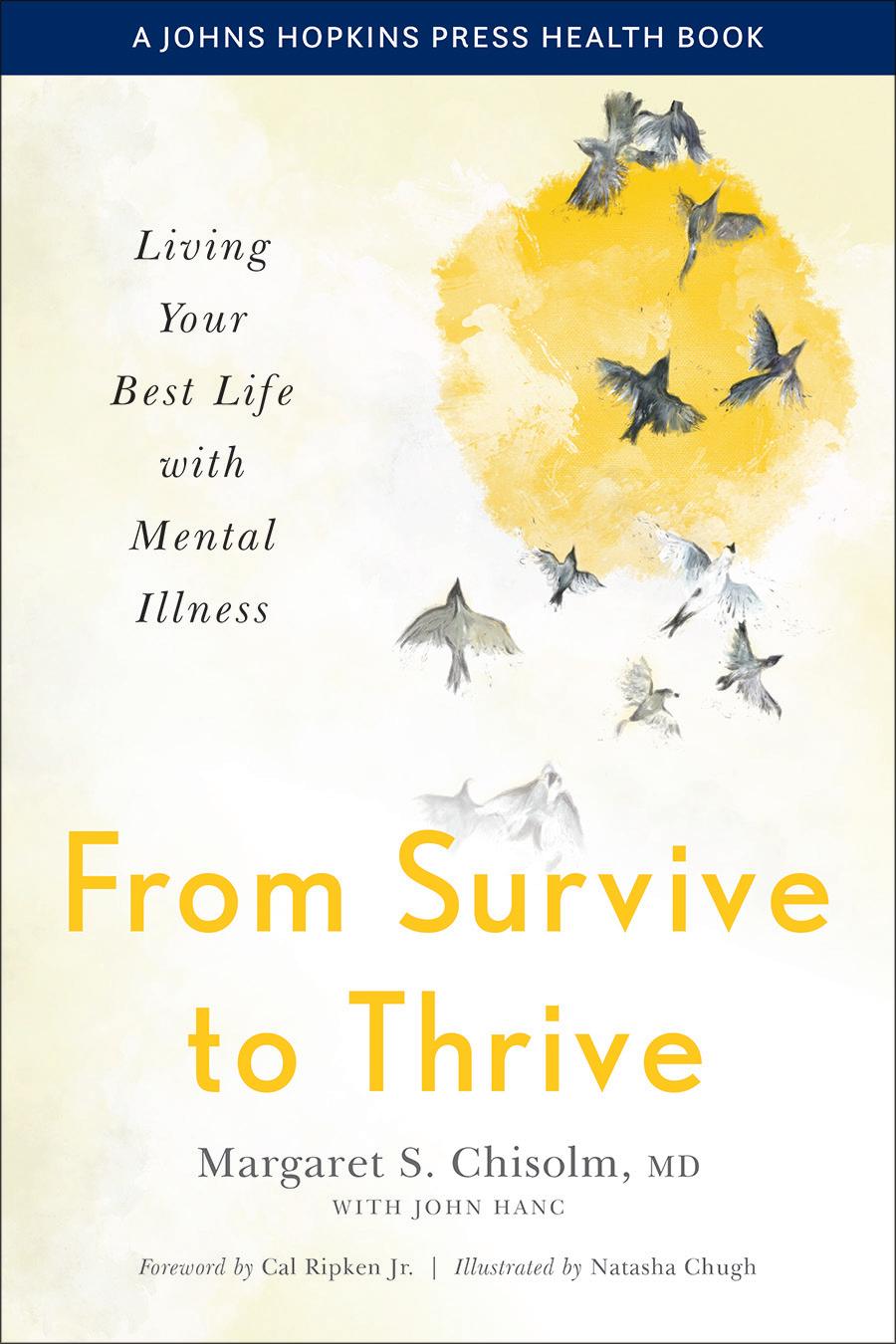
The only guide to caring for those with advanced Alzheimer disease.
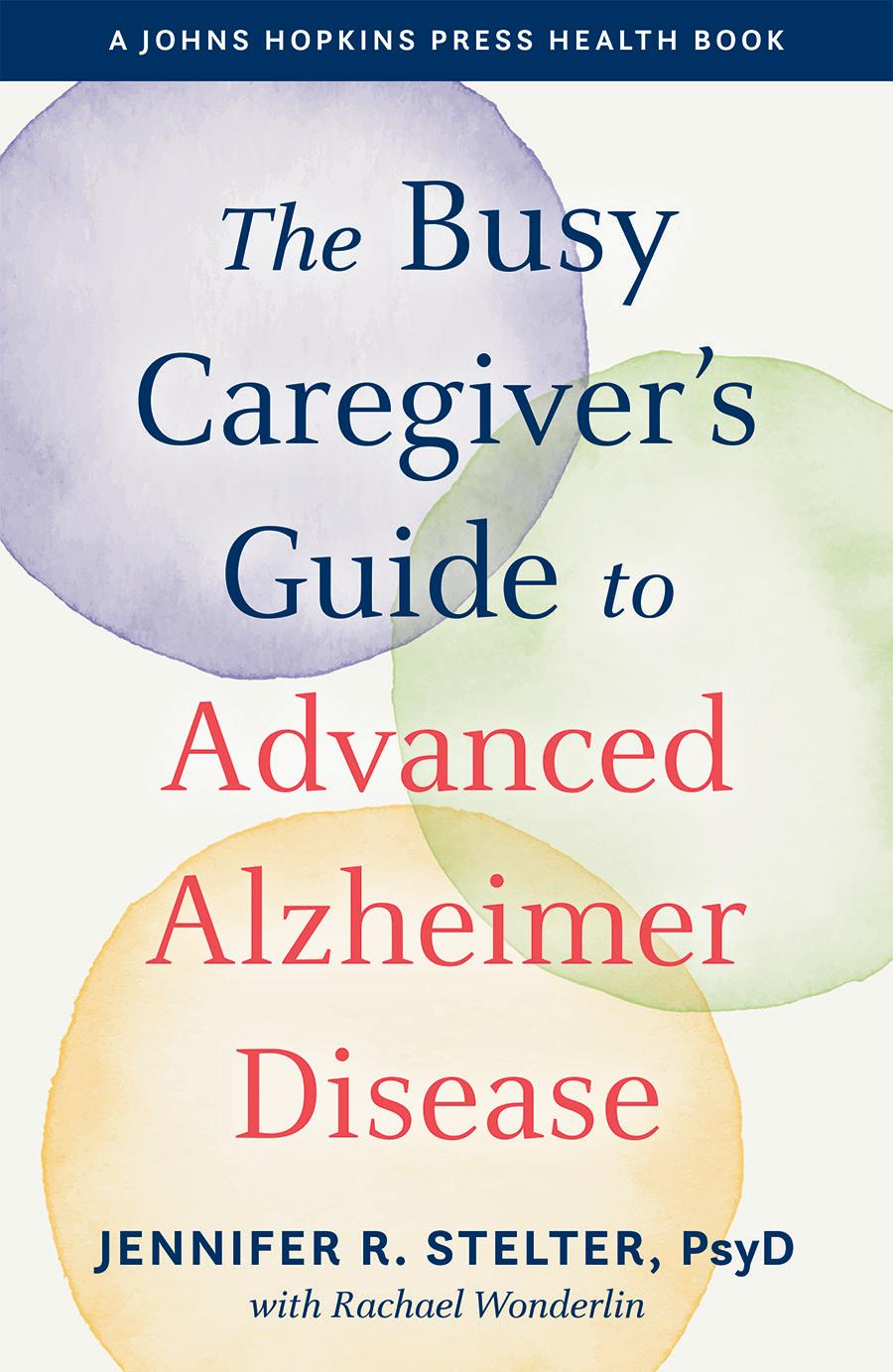
A Johns Hopkins Press Health Book
OCTOBER 192 pages 5½ x 8½ 6 halftones, 7 line drawings
978-1-4214-4108-5 $19.95 £15.00 pb
JENNIFER R. STELTER, PsyD
with Rachael Wonderlin
Caring for someone living with advanced Alzheimer disease is a challenge. It can make you feel like you’re on a hamster wheel—running in circles, trying the same things over and over with no effect on your loved one. In The Busy Caregiver’s Guide to Advanced Alzheimer Disease, Dr. Jennifer R. Stelter, a psychologist working in memory care, shares a new model designed to help caregivers understand, cope with, and handle some of the most challenging behaviors associated with the disease while encouraging and reinforcing independence and quality of life for their loved ones. Her Dementia Connection Model, which is based on current scientific research, will aid you in forging a positive bond with your loved one with less frustration.
Follow along, step by step, as Dr. Stelter outlines the three main elements of the Dementia Connection Model and learn how to put these elements into practice to help with
• communication problems • eating difficulties • mobility concerns • memory deficits • behavioral issues • toileting trouble • other common complications of Alzheimer disease
The evidenced-based, practical interventions and strategies in The Busy Caregiver’s Guide will help you stay emotionally, mentally, and physically involved in your loved one’s life. Special dedicated worksheets help you practice the skills and keep track of what is working. You’ll also read stories about other caregivers who face the same struggles.
JENNIFER R. STELTER, PsyD (CHICAGO, IL) is a licensed clinical psychologist, certified dementia practitioner and trainer, and consultant. She is the co-owner of NeuroEssence, LLC, and the owner of The Oil Doctor, PsyD, LLC. Gerontologist RACHAEL WONDERLIN (PITTSBURGH, PA) is a dementia care consultant who runs the popular blog and podcast Dementia By Day. She is the author of When Someone You Know Is Living in a Dementia Care Community and the coauthor of Creative Engagement: A Handbook of Activities for People with Dementia.
FINDING THE RIGHT WORDS
A Story of Literature, Grief, and the Brain
CINDY WEINSTEIN
with Bruce L. Miller, MD
In 1985, Cindy Weinstein’s beloved father, Jerry, was diagnosed with early-onset Alzheimer’s disease. Twelve years later, he died after having lost all of his memories—along with his ability to read, write, and speak.
Finding the Right Words follows Weinstein’s decades-long journey to come to terms with her father’s dementia as both a daughter and an English professor. Although her lifelong love of language and literature gave her a way to talk about her grief, she realized that she also needed to learn more about the science of dementia to make sense of her father’s death. To write her story, she collaborated with Dr. Bruce L. Miller, neurologist and director of the Memory and Aging Center at the University of California, San Francisco, combining personal memoir, literature, and the science and history of brain health into a unique, educational, and meditative work.
Finding the Right Words is an invaluable guide for families dealing with a life-changing diagnosis. In chapters of profound remembrance, Weinstein relies on literature to describe the shock of her father’s diagnosis. Writing in response to Weinstein’s deeply personal narrative, Dr. Miller describes the neurological processes responsible for the symptoms displayed by her father. Their two perspectives give readers a fuller understanding of Alzheimer’s than any one voice could.
“This graceful literary/scientific tag-team work by Cindy and Bruce provides an in-depth look into the valuable role of memory in our lives and the evolving science behind one of the most important systems of the human experience.” —Susan Schneider Williams, Board Vice Chair, American Brain Foundation
CINDY WEINSTEIN (SOUTH PASADENA, CA) is the Eli and Edythe Broad Professor of English at the California Institute of Technology. She is the author of Time, Tense, and American Literature: When Is Now? BRUCE L. MILLER, MD (SAN FRANCISCO, CA) is the A. W. and Mary Margaret Clausen Distinguished Professor in Neurology at the University of California, San Francisco, where he is the director of the Memory and Aging Center and the codirector of the Global Brain Health Institute. He is the coeditor of The Behavioral Neurology of Dementia. The moving story of an English professor studying neurology in order to understand and come to terms with her father’s death from Alzheimer’s.

SEPTEMBER 216 pages 6 x 9 20 halftones, 5 line drawings
978-1-4214-4126-9 $22.95 £17.00 hc
Also available as an e-book
Johns Hopkins Wavelengths In classrooms, field stations, and laboratories in Baltimore and around the world, the Bloomberg Distinguished Professors of Johns Hopkins University are opening the boundaries of our understanding of many of the world’s most complex challenges. The Johns Hopkins Wavelengths book series brings readers inside their stories, illustrating how their pioneering discoveries benefit people in their neighborhoods and across the globe in artificial intelligence, cancer research, food systems’ environmental impacts, health equity, science diplomacy, and other critical arenas of study. Through these compelling narratives, their insights will spark conversations from dorm rooms to dining rooms to boardrooms.
How can new understandings about cancer cell interactions help doctors better control, and eventually cure, cancer?
IS CANCER INEVITABLE?
ASHANI T. WEERARATNA, PhD

Johns Hopkins Wavelengths
DECEMBER 200 pages 5 x 7 5 b&w illus.
978-1-4214-4274-7 $16.95 £12.50 pb
Also available as an e-book In Is Cancer Inevitable?, Dr. Ashani T. Weeraratna—a pioneering melanoma researcher whose work explores the role aging plays in cancer cells’ spread and drug resistance—gives readers an inside look at the latest cancer advances. Detailing the actions that are reducing the disease’s impact and exploring what the future may hold, she explains how the molecular mechanisms involved in metastasis and the cells’ microenvironments influence cancer’s development and progression. Over the years, she writes, our understanding of how cancer cells move throughout the body, change as they plant themselves in the body’s microenvironments, and even communicate with one another have led to major insights about how cancer works. She explains how age-related changes in the microenvironment contribute to multiple aspects of melanoma formation and development. Such scholarship, she argues, is moving us toward a day when more patients will be declared cancer-free. The book
• Explores key insights and studies developed in recent years that have greatly influenced the world of cancer research, including how aging microenvironments within our bodies encourage metastasis and therapy resistance • Raises awareness about how cancer works within the body and what any patient or family encountering the disease needs to understand—while also offering them hope based on new and forthcoming diagnostic and treatment methods
ASHANI T. WEERARATNA, PhD (PHILADELPHIA, PA) is a Bloomberg Distinguished Professor of Cancer Biology and the chair of the Department of Biochemistry and Molecular Biology at the Johns Hopkins Bloomberg School of Public Health. A groundbreaking researcher focused on the connections between aging and cancer, Weeraratna is also the co–program leader of the Cancer Invasion and Metastasis Program at the Sidney Kimmel Comprehensive Cancer Center, Johns Hopkins School of Medicine, and the president of the Society for Melanoma Research.
ALSO IN THE SERIES Can Fixing Dinner Fix the Planet? Jessica Fanzo 978-1-4214-4112-2 $16.95 £12.50 Why Are Health Disparities Everyone’s Problem? Lisa Cooper, MD, MPH 978-1-4214-4115-3 $16.95 £12.50
CAN THE OBESITY CRISIS BE REVERSED?
REXFORD S. AHIMA, MD, PhD How can we work together to understand the rise of obesity and reverse its related diseases and societal impacts?
In Can the Obesity Crisis Be Reversed?, Dr. Rexford S. Ahima, MD, PhD, draws on his extensive laboratory and clinical experiences at top institutions to examine the complicated causes of obesity, as well as the most cutting-edge approaches for prevention and treatment. Ahima looks at how the rising trends of obesity and associated diseases are driving up health care costs. He also offers insight into the widespread suffering that obesity imposes and its disproportionate impacts in minority and underserved communities. Calling for greater societal and community engagement in stemming the obesity crisis, Ahima argues that there is an urgent need to promote healthier foods and environmental infrastructure as well as formal programs that reduce obesity. By understanding and applying fundamental knowledge, Can the Obesity Crisis Be Reversed? makes a convincing case that all of us, working individually and collectively, can help to reverse the obesity crisis. The book
• Provides information on the biological pathways that control eating and metabolism • Explains genetic and environmental bases of obesity • Reviews the contributions of diet and physical activity to weight gain while speaking to the folly and dangers of individual blame • Offers practical recommendations for healthy diets, exercise, and lifestyle • Discusses current medical and surgical treatments for obesity • Examines comprehensive societal strategies for obesity prevention
REXFORD S. AHIMA, MD, PhD (BALTIMORE, MD) is a Bloomberg Distinguished Professor of Diabetes within the Schools of Medicine, Public Health, and Nursing at Johns Hopkins University, where he is the director of the Division of Endocrinology, Diabetes and Metabolism and the leader of the Johns Hopkins Diabetes Initiative. He is the editor-in-chief of the Journal of Clinical Investigation and the editor of Metabolic Syndrome: A Comprehensive Textbook. Johns Hopkins Wavelengths

DECEMBER 184 pages 5 x 7
978-1-4214-4271-6 $16.95 £12.50 pb
Also available as an e-book
Have the social safety nets, environmental protections, and policies to redress wealth and income inequality enacted after World War II contributed to declining rates of dementia today?

SEPTEMBER 424 pages 61/8 x 9¼ 29 halftones, 20 line drawings
978-1-4214-4047-7 $29.95 £22.00 hc
Also available as an e-book
AMERICAN DEMENTIA
Brain Health in an Unhealthy Society
For decades, researchers have chased a pharmaceutical cure for memory loss. But despite the fact that no disease-modifying biotech treatments have emerged, new research suggests that dementia rates have actually declined in the United States and Western Europe over the last decade.
In American Dementia, Daniel R. George, PhD, MSc, and Peter J. Whitehouse, MD, PhD, argue that the current decline of dementia may be strongly linked to mid–twentieth century policies that reduced inequality, provided widespread access to education and health care, and brought about cleaner air, soil, and water. They also
• explain why Alzheimer’s disease is the hallmark illness of our current hypercapitalist era; • reveal how the soaring inequalities of the twenty-first century—which are sowing poverty, barriers to health care and education, loneliness, lack of sleep, stressful life events, environmental exposures, and climate change—are reversing the gains of the twentieth century and damaging our brains; • tackle the ageist tendencies in our culture, which disadvantage both vulnerable youth and elders; • make an evidence-based argument that policies like single-payer health care, a living wage, and universal access to free higher education and technical training programs will build collective resilience to dementia; and • promote strategies that show how local communities can rise above disconnection and loneliness and come together to care for our struggling neighbors.
DANIEL R. GEORGE, PhD, MSc (HERSHEY, PA) is an associate professor in the Department of Humanities and the Department of Public Health Sciences at Penn State College of Medicine. PETER J. WHITEHOUSE, MD, PhD (CLEVELAND, OH) is a professor of neurology at Case Western Reserve University and the cofounder of the Intergenerational Schools. Together, they are the coauthors of The Myth of Alzheimer’s: What You Aren’t Being Told about Today’s Most Dreaded Diagnosis.
MISUNDERSTANDING HEALTH
Making Sense of America’s Broken Health Care System
ROHIT KHANNA This eminently relevant and thoroughly entertaining book reminds us that understanding more about health care helps us understand the larger world around us.
With technological advances and information sharing so prevalent, health care should be more transparent and easier to access than ever before. So why does it seem like everything about it —from pricing, drug development, and the emergence of new diseases to the intricacies of biologic and precision medicine therapies—is becoming more complex?
Rohit Khanna’s Misunderstanding Health examines some of today’s most revealing health care trends while imploring us to look at these issues with alacrity, humor, and vigilance. Over the course of eighteen short, engaging chapters, Khanna explains
• how unexamined beliefs can endanger patients, drive up cost, and increase bureaucracy • the “Dr. Google” effect on the ways that we seek (or eschew) care • why our health care costs more than in any other country • the unintended consequences of using rating sites like Yelp • what we can learn about health care from hurricanes • how social media influencers impact health care • how artificial intelligence can improve health care • why health screening programs are so complicated • what the industry is doing to combat health care fraud • how to think about behavioral “nudges” designed to improve health • why understanding how data are collected is critical to understanding what the data can tell us
Each provocative and easy-to-read chapter covers a familiar aspect of health care in a clear and succinct way and offers inquisitive readers a warts-and-all view of American health care.
ROHIT KHANNA (TORONTO, ON) is the founder and president of Catalytic Health. He earned his MBA from Queen’s School of Business, his MSc from the London School of Economics and Political Science, and his MPH from the Harvard School of Public Health. OCTOBER 224 pages 6 x 9 23 line drawings
978-1-4214-4209-9 $27.95 £20.50 hc
Also available as an e-book

A compelling look at the historical roots of poverty and homelessness, the “worthy” and “unworthy” poor, and the role of charity health care and public policy in the United States.
SKID ROAD
On the Frontier of Health and Homelessness in an American City
JOSEPHINE ENSIGN

AUGUST 312 pages 6 x 9 10 plates
978-1-4214-4013-2 $29.95 £22.00 hc
Also available as an e-book Seattle has the third-highest homeless population in the United States. In 2018, an estimated 8,600 homeless people lived in the city, a figure that does not include the significant number of “hidden” homeless people doubled up with friends or living in and out of cheap hotels. In Skid Road, Josephine Ensign digs through layers of Seattle history to reveal the stories of overlooked and long-silenced people who live on the margins of society.
How, Ensign asks, has a large, socially progressive city like Seattle responded to the health needs of people marginalized by poverty, mental illness, addiction, identity-based discrimination, and homelessness? Drawing on interviews and extensive research, Ensign shares a diversity of voices within contemporary health care and public policy debates.
Informed by her own lived experience of homelessness, as well as over three decades of work as a family nurse practitioner providing primary health care to homeless people, Ensign is uniquely situated to explore the tensions that polarize perspectives on homelessness. A timely story in light of the ongoing health care reform debate, the affordable housing crisis, and the COVID-19 pandemic, the stories from Skid Road illuminate issues surrounding poverty and homelessness throughout America.
“Timely, unique, and important. I have never read a book quite like this one. A gifted writer, Ensign uses narrative history to reveal various intersectionalities and tensions in the machine of structural and systemic inequities, oppression, violence, and trauma.”—Sara K. Rankin, Homeless Rights Advocacy Project, Seattle University School of Law
JOSEPHINE ENSIGN (SEATTLE, WA) is a professor in the School of Nursing and an adjunct professor in the Department of Gender, Women & Sexuality Studies at the
University of Washington. She is the author of Catching Homelessness: A Nurse’s Story of Falling through the Safety Net and Soul Stories: Voices from the Margins.
WHAT THE AMISH TEACH US
Plain Living in a Busy World What do the traditional plain-living Amish have to teach twenty-first-century Americans in our hyper-everything world? As it turns out, quite a lot!
DONALD B. KRAYBILL
Having spent four decades researching Amish communities, Donald B. Kraybill is in a unique position to share important lessons from these fascinating Plain people. In this inspiring book, we learn intriguing truths about community, family, education, faith, forgiveness, aging, and death from real Amish men and women. The Amish are ahead of us, for example, in relying on apprenticeship education. They have also out-Ubered Uber for nearly a century, hiring cars owned and operated by their neighbors. Kraybill also explains how the Amish function in modern society by rejecting new developments that harm their community, accepting those that enhance it, and adapting others to fit their values.
Pairing storytelling with informative and reflective passages, these twenty-two essays offer a critique of modern culture that is provocative yet practical. In a time when civil discourse is raw and coarse and our social fabric seems torn asunder, What the Amish Teach Us uproots our assumptions about progress and prods us to question why we do what we do.
“Donald Kraybill remains the unrivalled master of scholarly works on the Amish. This book—full of tightly constructed writing and well-defined content—demonstrates his authority to speak on Amish culture as a recognized expert. Each essay offers an intriguing compare-and-contrast of Amish life with the hypermodern approaches of mainstream culture.” —James A. Cates, author of Serpent in the Garden: Amish Sexuality in a Changing World
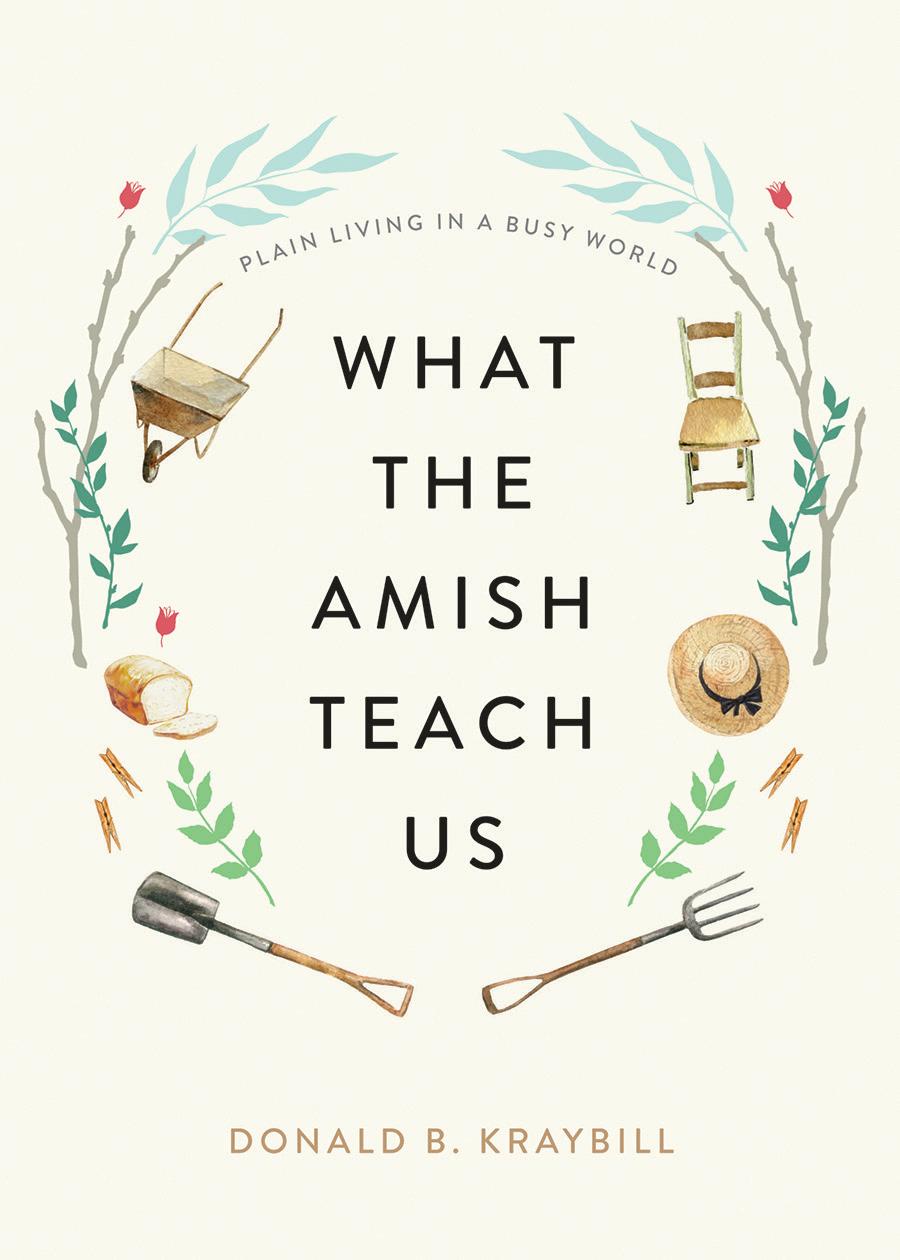
DONALD B. KRAYBILL (ELIZABETHTOWN, PA) is distinguished professor and senior fellow emeritus in the Young Center for Anabaptist and Pietist Studies at Elizabethtown College. He is the coauthor of The Amish and the author of Renegade Amish: Beard Cutting, Hate Crimes, and the Trial of the Bergholz Barbers. SEPTEMBER 144 pages 5 x 7
978-1-4214-4217-4 $14.95 £11.00 hc
Also available as an e-book
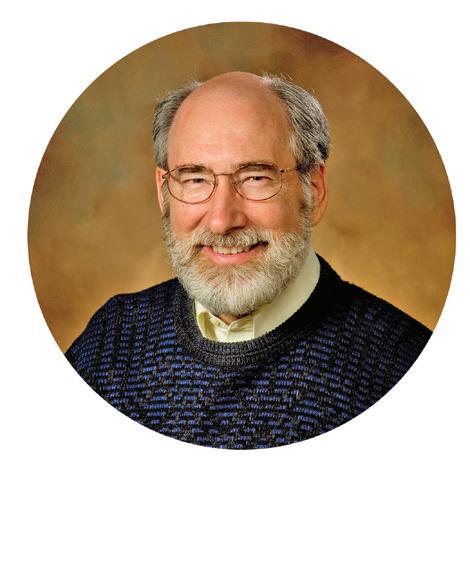
also by DONALD B. KRAYBILL The Amish 978-1-4214-2566-5 $26.95 £20.00 Renegade Amish 978-1-4214-2512-2 $15.95 £12.00
POCKET EINSTEIN The Pocket Einstein series is a collection of essential pocket-sized guides for anyone looking to understand a little more about some of the most important and fascinating areas of science in the twenty-first century. Broken down into ten simple lessons and written by leading experts in their field, the books reveal the ten most important takeaways from those areas of science you’ve always wanted to know more about.

Pocket Einstein Series
AUGUST 192 pages 5 x 7 32 b&w illus.
978-1-4214-4242-6 $14.95 pb
Also available as an e-book Market: USC
RENEWABLE ENERGY
Ten Short Lessons
STEPHEN PEAKE An expert introduction to the fascinating world of renewable energy and the transition from fossil fuels to clean energy that lies at the heart of a brighter climate future.
In Renewable Energy: Ten Short Lessons, Stephen Peake distills the key issues of this timely subject, examining how we can harness the power of a range of groundbreaking energy technologies most effectively to achieve a sustainable energy future.
Renewable energy is central to managing climate change and our transition to a sustainable energy supply for the 10 billion of us who will populate the earth by 2050. But how will we cope without fossil fuels to heat, cool, and light our buildings, power our industry, and run our transport systems? And are some renewables better than others? Packed full of easy-to-understand diagrams and fact boxes, these ten lessons cover all the basics, as well as the latest understanding and developments, to enlighten the nonscientist.
“A delightful read. This concise guide to sustainability, which is full of clever turns of phrase, does an excellent job leading the reader through the challenges of the renewable industry. Another great, timely addition to the Pocket Einstein series.” —Ingrid Ockert, science writer
STEPHEN PEAKE (CAMBRIDGE, UK) is a professor of climate change and energy at the Open University, a fellow of the Cambridge Judge Business School, and a senior associate of the Cambridge Institute for Sustainability Leadership at the University of Cambridge.
POCKET EINSTEIN
ALSO IN THE SERIES Artificial Intelligence and Robotics by Peter J. Bentley 978-1-4214-3972-3 $14.95 Space Travel by Paul Parsons 978-1-4214-3974-7 $14.95
TIME TRAVEL
Ten Short Lessons
BRIAN CLEGG During times like these, who hasn’t daydreamed about traveling forward or backward in time?
In Time Travel: Ten Short Lessons, popular-science master Brian Clegg gives a grand tour of the essential lessons in this game-changing area of physics, from the imagination of novelists to current research.
Einstein’s special theory of relativity told us that time travel to the future was possible, and later his general theory of relativity showed us that loops in spacetime could exist, meaning that we might be able to bend time backward, too. But what are the practicalities of making time travel possible? What do we still need to know? How do we deal with paradoxical twists in time—and could quantum physics hold the answer? Packed full of easy-to-understand diagrams and fact boxes, these ten lessons cover all the basics, as well as the latest understanding and developments, to enlighten the nonscientist.
“Time Travel lucidly sums up the essential parts of this fascinating subject.” —John Gribbin, author of The Scientists: A History of Science Told through the Lives of Its Greatest Inventors
Best-selling science writer BRIAN CLEGG (SWINDON, UK) studied physics at Cambridge University. The author of numerous books, including What Do You Think You Are? The Science of What Makes You You and Big Data: How the Information Revolution Is Transforming Our Lives, he is the editor of the website Popular Science, www.popularscience.co.uk. Pocket Einstein Series

AUGUST 192 pages 5 x 7 30 b&w illus.
978-1-4214-4240-2 $14.95 pb
Also available as an e-book Market: USC

OCTOBER 352 pages 8½ x 11 167 color photos, 12 color illus.
978-1-4214-3941-9 $34.95 £26.00 hc
Also available as an e-book

also by WAYNE LYNCH Owls of the United States and Canada 978-0-8018-8687-4 $41.95 £31.00
BEARS OF THE NORTH
A Year Inside Their Worlds
WAYNE LYNCH
An unprecedented visual and scientific journey into the secret world of bears. Follow black bear cubs through spring in the forest, witness brown bears feasting In Bears of the North, renowned wildlife pho- through summer and autumn, tographer, naturalist, and bestselling author and battle through winter with Wayne Lynch offers us a work of scintillating polar bears on the tundra. science and stunning beauty. Following the polar bear, the brown bear, the Asiatic black bear, and the American black bear through the four seasons, Lynch provides readers with an insider’s view of the mysteries of hibernation and the birth of cubs in winter; the relentless quest for food and mating rituals in spring; hunting, fishing, and daily activities in summer; and the feeding frenzy and exuberant play that precedes hibernation in autumn. Dispelling the stereotypes—but none of the magic—surrounding these magnificent creatures, Lynch comments on the latest scientific discoveries related to the biology, behavior, and ecology of bears. He explains how satellite telemetry has revealed the purpose behind the meanderings of bears and the great distances they sometimes cover on land and in water.
Taking us out into the wild to share his firsthand observations of the magnificent bears of the northern hemisphere, Lynch describes their survival strategies and the threats they face from habitat fragmentation and global climate change. Lynch’s fascinating narrative is enhanced by over 150 gorgeous color photographs capturing bears in their natural habitats, including the mysterious moon bear, fierce polar bear battles, and rare images of mothers’ intimate moments with their cubs. Informed by Lynch’s nearly forty years of experience observing and photographing bears in the wild, and aided by ever-more-sophisticated digital photo technologies, Bears of the North introduces readers to a new universe of enthralling portraits of bears in their natural environments.
Renowned wildlife photographer WAYNE LYNCH (CALGARY, AB) is the author of or photographer for numerous books, including Penguins of the World, Owls of the United States and Canada: A Complete Guide to Their Biology and Behavior, Planet Arctic: Life at the Top of the World, Polar Bears: A Complete Guide to Their Biology and Behavior, The Great Northern Kingdom: Life in the Boreal Forest, and Alligators: The Illustrated Guide to Their Biology, Behavior, and Conservation.
THE CHEMISTRY OF FEAR
Harvey Wiley’s Fight for Pure Food
JONATHAN REES
A fascinating examination of the controversial work of Harvey Wiley, the founder of the pure food movement and an early crusader against the use of Though trained as a medical doctor, chemist Harvey additives and preservatives Wiley spent most of his professional life advocating in food. for “pure food”—food free of both adulterants and preservatives. Wiley gained fame for what became known as the Poison Squad experiments— a series of tests in which, to learn more about the effects of various chemicals on the human body, Wiley’s own employees at the Department of Agriculture agreed to consume food mixed with significant amounts of various additives, including borax, sulfuric acid, and formaldehyde. One hundred years later, Wiley’s influence lives on in many of our current popular ideas about food: that the wrong food can kill you; that the right food can extend your life; that additives are unnatural; and that unnatural food is unhealthy food.
In The Chemistry of Fear, Jonathan Rees examines Wiley’s many—and varied—conflicts and clashes over food safety, including the addition of caffeine to Coca-Cola and formaldehyde to milk. Although Wiley is often depicted as an unwavering champion of the consumer’s interest, Rees argues that his critics rightfully questioned some of his motivations, as well as the conclusions that he drew from his most important scientific work. And although Wiley’s fame and popularity gave him enormous influence, Rees reveals that his impact on what Americans eat depends more upon fear than it does upon the quality of his research.
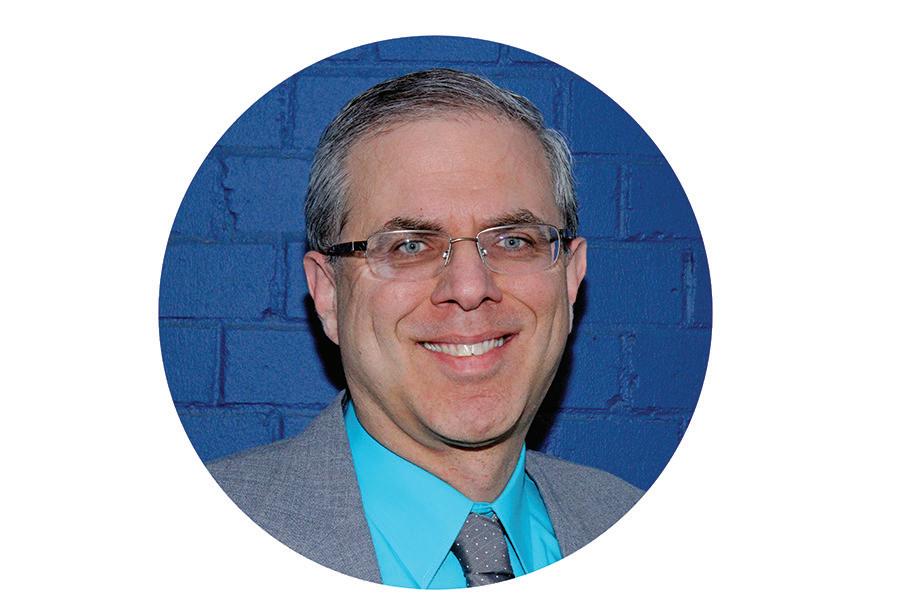
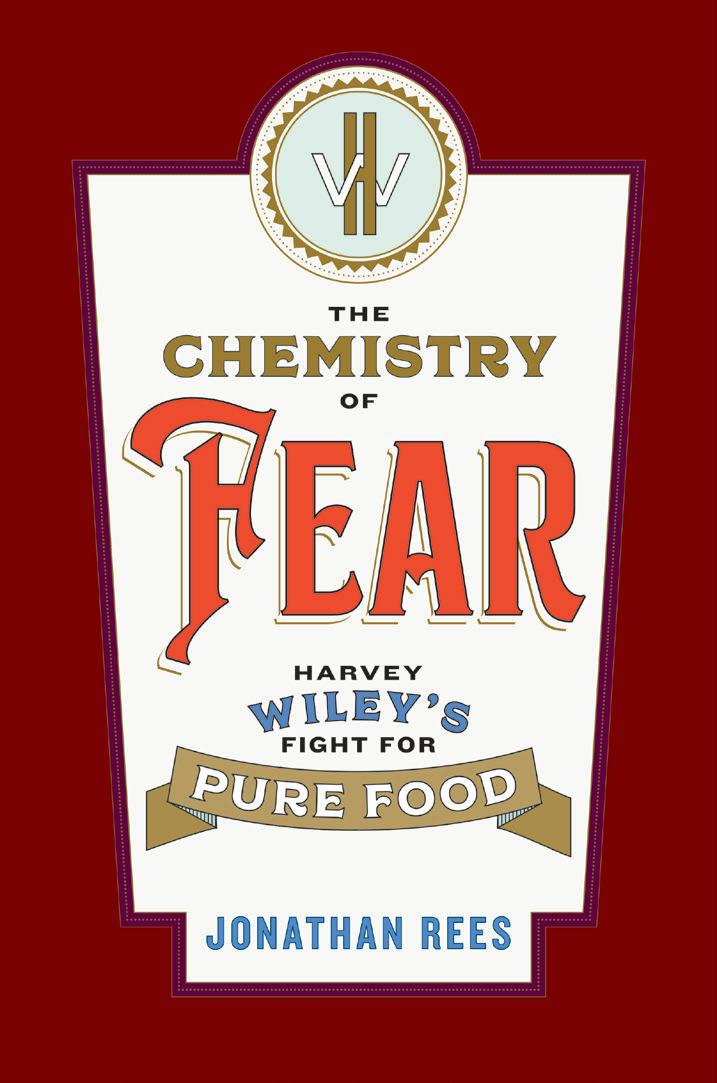
JULY 320 pages 6 x 9 15 b&w illus.
978-1-4214-3995-2 $34.95 £26.00 pb
Also available as an e-book
“Providing a history of how Americans came to construct a dichotomy between pure and adulterated foods, The Chemistry of Fear makes a useful and novel contribution to the field of food history.”—Megan J. Elias, author of Food on the Page: Cookbooks and American Culture
JONATHAN REES (PUEBLO, CO) is a professor of history at Colorado State University–Pueblo. also by JONATHAN REES Refrigeration Nation 978-1-4214-1986-2 $29.95 £22.00 Before the Refrigerator 978-1-4214-2459-0 $19.95 £15.00
The definitive account of the lynching of twenty-two-year-old Matthew Williams in Maryland, the subsequent investigation, and the legacy of “modern-day” lynchings.
THE SILENT SHORE
The Lynching of Matthew Williams and the Politics of Racism in the Free State
CHARLES L. CHAVIS JR.

JANUARY 288 pages 6 x 9 26 b&w photos, 10 b&w illus.
978-1-4214-4292-1 $29.95(s) £22.00 hc
Also available as an e-book On December 4, 1931, a mob of white men in Salisbury, Maryland, lynched and set ablaze a twenty-two-year-old Black man named Matthew Williams. His gruesome murder was part of a wave of white terrorism in the wake of the stock market crash of 1929. For nearly a century, the lynching of Matthew Williams has lived in the shadows of the more well-known incidents of racial terror in the deep South, haunting both the Eastern Shore and the state of Maryland as a whole. In The Silent Shore, author Charles L. Chavis Jr. draws on his discovery of previously unreleased investigative documents to meticulously reconstruct the full story of one of the last lynchings in Maryland.

Bringing the painful truth of anti-Black violence to light, Chavis breaks the silence that surrounded Williams’s death. Maryland was the site of at least 40 spectacle lynchings after the abolition of slavery in 1864. Families of lynching victims rarely obtained any form of justice, but Williams’s death would have a curious afterlife: the politically ambitious Governor Albert C. Ritchie became one of the first governors in the United States to investigate the lynching death of a Black person. Richie tasked Patsy Johnson, a member of the Pinkerton detective agency and a former prizefighter, with going undercover in Salisbury and infiltrating the mob that murdered Williams. Johnson would eventually befriend a young local who admitted to participating in the lynching and who also named several local law enforcement officers as ringleaders. Despite this, a grand jury, after hearing 124 witness statements, declined to indict the perpetrators.
CHARLES L. CHAVIS JR. (FAIRFAX, VA) is an assistant professor of conflict resolution and history at George Mason University, where he is the director of the John Mitchell, Jr., Program for History, Justice, and Race at the Jimmy and
Rosalynn Carter School for Peace and Conflict Resolution. The national cochair for the United States Truth, Racial Healing, and Transformation Movement and the vice chair of the Maryland Lynching Truth and Reconciliation
Commission, he is the coeditor of For the Sake of Peace: Africana Perspectives on Racism, Justice, and Peace in America.




